|
|
|
Sort Order |
|
|
|
Items / Page
|
|
|
|
|
|
|
| Srl | Item |
| 1 |
ID:
087320
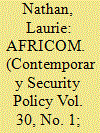

|
|
|
| 2 |
ID:
178370


|
|
|
|
|
| Summary/Abstract |
The causes and consequences of ceasefires have become a burgeoning area of research. The concept of ceasefire success is integral to this research and plays a key role as either the dependent or independent variable in both qualitative and quantitative work. Despite its importance, it is not clear how ceasefire success should be conceptualized. This critically hampers the progress of theoretical and empirical research on ceasefires. This article offers a conceptual framework based on the central proposition that ceasefire success should be assessed in terms of two inter-related but conceptually distinct criteria: the immediate objective and the underlying purpose. The immediate objective, which is embedded in the definition of a ceasefire, is the cessation of hostilities (either permanently or temporarily). While all ceasefires share this objective, their underlying purpose, which is the reason for establishing the ceasefire, varies widely across cases. The immediate objective and the purpose, while conceptually distinct, are linked since the purpose informs the temporal and geographic scope of the cessation of hostilities. Based on this framework, we argue that researchers interested in ceasefire success need to clearly identify their assumptions and conceptual choices, which should take account of the political context of the ceasefires in question.
|
|
|
|
|
|
|
|
|
|
|
|
|
|
|
|
| 3 |
ID:
060983


|
|
|
|
|
| Publication |
Mar 2005.
|
| Summary/Abstract |
South Africa's foreign policy, conducted in an ad hoc and haphazard fashion under President Nelson Mandela, has been consolidated under the presidency of Thabo Mbeki. This article first outlines five consistent policy themes: Africa and Africanist; democracy and respect for human rights; a holistic understanding of security; a pacific approach to conflict resolution; and multilateralism. The article then identifies and attempts to explain a number of significant inconsistencies in relation to these themes, including Mbeki's 'quiet diplomacy' on Zimbabwe; his denialist position on HIV/AIDS; South Africa's controversial arms procurement programme; and its domestic xenophobia. Some of these inconsistencies have undermined the country's international credibility and at times overhshadowed its considerable achievements.
|
|
|
|
|
|
|
|
|
|
|
|
|
|
|
|
| 4 |
ID:
071782
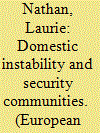

|
|
|
|
|
| Publication |
2006.
|
| Summary/Abstract |
The problem of political instability is neglected in the literature on security communities. In this article I argue that domestic stability, defined as the absence of large-scale violence in a country, is a necessary condition of these communities. Domestic violence precludes the existence of security communities because it renders people and states insecure; it creates the risk of cross-border destabilization and violence; and it generates uncertainty and tension among states, inhibiting trust and a sense of collective identity. I conclude that the benchmark of a security community-dependable expectations of peaceful change-should apply as much within states as between them. This is consistent with the work of Karl Deutsch, whose pioneering concept of a security community is widely understood to mean the absence of interstate war. Deutsch, in fact, was equally concerned with large-scale internal violence.
|
|
|
|
|
|
|
|
|
|
|
|
|
|
|
|
| 5 |
ID:
152741


|
|
|
| 6 |
ID:
095125
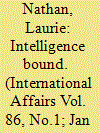

|
|
|
|
|
| Publication |
2010.
|
| Summary/Abstract |
This article explores the functions and impact of the South African constitution in relation to the country's intelligence services. The constitution has proved to be a powerful instrument for transforming, controlling and constraining the services, safeguarding human rights and contributing to the management of political conflicts and crises. Yet the constitution's relevance for the intelligence community is also contested and contradictory. Paradoxically, the executive, parliament and the intelligence services believe that it is legitimate for the services to deviate from constitutional provisions because their mandate to identify and counter threats to national security is intended to protect the constitution. The article contributes to filling a gap in the literature on security sector reform, which is concerned with democratic governance but ignores the role of a constitution in regulating the security organizations and determining the nature of their governance arrangements. Intelligence agencies around the world have special powers that permit them to operate with a high level of secrecy and acquire confidential information through the use of intrusive measures. Politicians and intelligence officers can abuse these powers to manipulate the political process, infringe the rights of citizens and subvert democracy. While a constitution cannot eliminate these risks, it can establish an overarching vision, a set of principles and rules and a range of mechanisms for promoting intelligence transformation and adherence to democratic norms.
|
|
|
|
|
|
|
|
|
|
|
|
|
|
|
|
| 7 |
ID:
131108
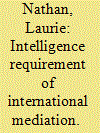

|
|
|
|
|
| Publication |
2014.
|
| Summary/Abstract |
This article explores the intelligence requirement of international mediation, a topic that is ignored in both the literature on conflict resolution and the literature on intelligence. A mediator's strategies and tactics ought to be informed by a deep understanding of the parties' internal calculations about the conflict and its resolution. Intelligence is needed to gain this understanding because the parties typically do not reveal their sensitive deliberations to outsiders. United Nations mediation teams should have a monitoring and analysis unit that endeavours to meet this need and reduce the ignorance that commonly afflicts international mediation.
|
|
|
|
|
|
|
|
|
|
|
|
|
|
|
|
| 8 |
ID:
101916


|
|
|
|
|
| Publication |
2011.
|
| Summary/Abstract |
Under former President Mbeki, South Africa provoked international dismay and criticism when it tried to block United Nations censure of Burma, Sudan, and Zimbabwe for gross human rights abuses. In the case of Sudan, Pretoria stood accused of turning a blind eye to Khartoum's excessive and indiscriminate violence in Darfur, betraying South Africa's own struggle for democracy and commitment to promoting human rights. This article seeks to shed light on Pretoria's foreign policy by explaining its position on Darfur and exploring the relationship between ideas and interests in shaping the policy. I argue that the position on Darfur was not unfathomable or realist, as some observers claimed, but was based on the core ideas of South Africa's foreign policy: the African Renaissance; quiet diplomacy as the most effective means of dealing with pariah regimes; solidarity with African governments under pressure from the West; and an anti-imperialist paradigm that provided the lens through which the government viewed the global order, defined the country's interests, and conceptualized human rights. Whereas most studies of Pretoria's foreign conduct pay little heed to the policies of the ruling party, I show that the conduct flowed logically from the party's anti-imperialist ideology.
|
|
|
|
|
|
|
|
|
|
|
|
|
|
|
|
| 9 |
ID:
097660


|
|
|
|
|
| Publication |
2009.
|
| Summary/Abstract |
This article sets out an agenda for intelligence reform in South Africa. It presents the findings of the Ministerial Review Commission on Intelligence and offers proposals regarding adherence to the Constitution, the White Paper on Intelligence, ministerial control and responsibility, the domestic intelligence mandate, limits on intrusive measures and transparency.
|
|
|
|
|
|
|
|
|
|
|
|
|
|
|
|
| 10 |
ID:
078513


|
|
|
| 11 |
ID:
174553
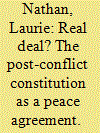

|
|
|
|
|
| Summary/Abstract |
When intra-state armed conflicts end through a negotiated settlement, the conflict parties frequently agree to amend or replace the country’s constitution. Their aim is to entrench the settlement, address the conflict incompatibility, reform institutions and take other measures to prevent a recurrence of violence. This article argues that post-conflict constitutions (PCCs) should be understood as peace agreements. It motivates this argument on conceptual, functional and legal grounds. It demonstrates that PCCs comply with conventional definitions of a peace agreement, are an intrinsic component of the conflict resolution process and have a range of peace maintenance functions. As supreme law, they become the definitive peace agreement. Research on peace durability following negotiated settlements should therefore focus not only on comprehensive peace agreements (CPAs) but also on PCCs. PCCs should be conceived not as mere components of CPA implementation but as substantive political and legal agreements in their own right and as independent causes of peace.
|
|
|
|
|
|
|
|
|
|
|
|
|
|
|
|
|
|
|
|
|